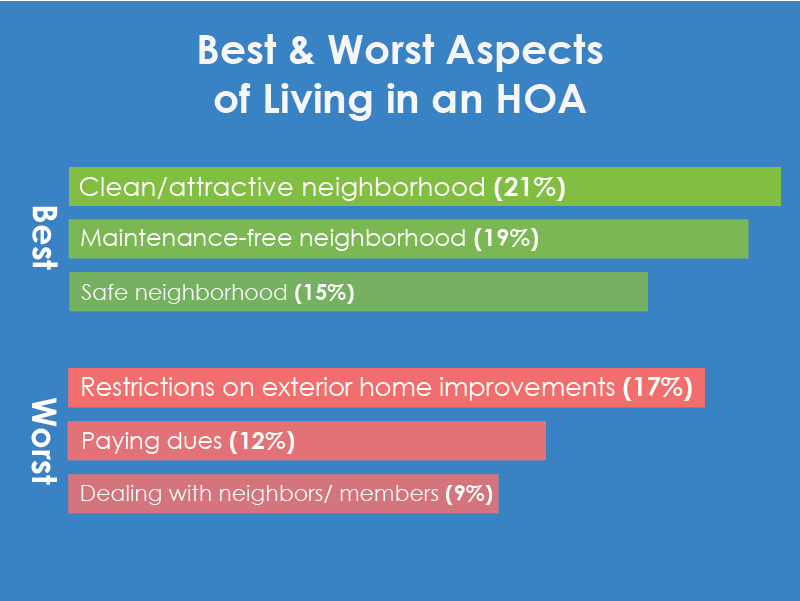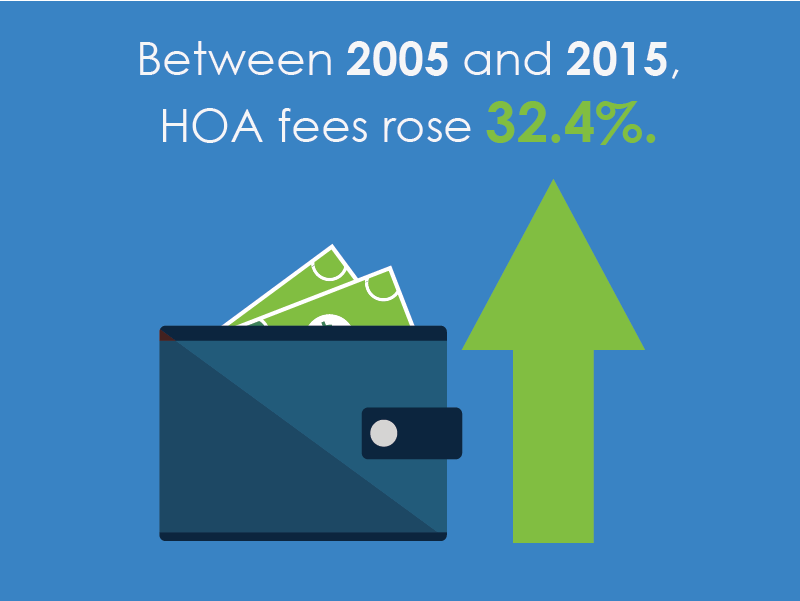The U.S. economy is looking alive as Americans enjoy more freedoms that were stunted by COVID-19. The housing market, which remained surprisingly strong throughout the pandemic, continues to see a demand for homes that surpasses available inventory in many states.
Spacious single-family homes with big backyards are what house hunters are looking for right now, and according to the Community Associations Institute (CAI), HOAs and community associations remain the preferred housing options for millions of homebuyers.
The number of new condo and homeowners associations is expected to increase by 4,500 in 2021, anticipates the Foundation for Community Association Research, an affiliate organization of CAI.
Representing nearly ¼ of the housing stock in the U.S., community associations house more than 73 million Americans. The 2021 projections reflect a 1.3% increase in new communities, so it’s safe to say HOAs will continue to flourish for the foreseeable future.
What is it that makes HOAs so attractive? One reputable 2020 survey found that despite the bad rap residential associations sometimes get, 89% of participants who live in these communities rated their overall association experience as good or very good.
If you’re on the fence about moving into an HOA, take a look at the pros and cons before making your decision.
What is an HOA?
A homeowners association is an organization that oversees a neighborhood or development by creating and enforcing rules and maintaining the property. In exchange for access to the perks that HOAs have to offer, those who purchase a home in an HOA community are obligated to pay fees or dues for the services they receive. HOAs also have a board of directors, and many also elect to hire a property management company. These leaders help ensure that the place where you live is kept clean and safe. As a result, property values remain high, which is something all homeowners want.
The pros
Below are the main reasons why people decide to move into an HOA.
Property value
One of the chief objectives of any HOA is to maintain the property values of the homes, and the community as a whole. If you live in an HOA that is well cared for, when it comes time to sell, chances are very high that you will be able to get a significant return on your investment.
Curb appeal is a big factor that can bring up property values. As such, an HOA will create rules that help maintain uniformity and keep the neighborhood clean and attractive.
Quality of life
Members of HOAs are expected to follow the rules designed for the community. While too many rules can make owners feel restricted by regulations, fair and reasonable rules actually work to give owners a higher quality of life. Thanks to rules, it’s clear what members can and cannot do. This minimizes conflicts and disputes between neighbors.
Presence of leadership
Unlike other residential communities, HOAs are run by owners who volunteer to sit on the board of directors or be a part of a committee. Board members are elected by members of the HOA. The size of the board will vary depending on what the governing documents call for, but most boards have 3 to 7 members.
The board makes decisions regarding finances, projects, activities, operations, etc., on behalf of the entire community. While some issues will require support from the majority of owners, other decisions are made by just the members of the board. Board members are required to act in good faith, and to promote the best interests of the entire association. Much of the time, that means making decisions that not all members agree with.
The board is also responsible for overseeing the day-to-day operations of the association, such as enforcing violations, approving architectural change requests, managing owner issues, paying bills, and collecting dues. Since board members may also have full-time jobs and lead busy lives, the association may hire a property management company to take over some of the more time-consuming or repetitive tasks.
Convenience
Every member of an HOA is required to pay fees. However, those fees may cover things like lawn care, snow shoveling, and other general maintenance tasks. For many, having fewer chores to perform is one of the biggest pros to being an HOA member.
Utilities may also be included in the fees owners pay. It’s not unheard of for HOAs to roll all of an owner’s utilities into one monthly fee. Basic utilities covered by HOA fees may include sewer, water, trash, recycling, and gas.
Amenities
The other big sell for HOAs is the access to amenities. Some communities may have a pool, tennis court, playground, clubhouse or party room, or even a golf course. These shared facilities are available to all members, and they never have to worry about cleaning or repairing a thing. The HOA will make sure the amenities are cared for.
Conflict resolution
If the neighbors are making too much noise every weekend, or have decided to remodel their front yard with giant animal statues, you aren’t entirely responsible for trying to negotiate with them. If your neighbor is exhibiting disruptive, destructive or even dangerous behavior, and you’re not the only one to notice, an owner can lodge a complaint against the neighbor and the board or property manager will look into it. If they have broken a rule or bylaw, they may receive a warning letter or formal violation notice. If the issue continues, the board can use its limited powers and exercise other options such as restricting access to amenities or charging fines. In serious cases, the owner may be brought to court. The association is obligated to enforce all HOA rules so that the peace and property values are maintained.
Sense of community
If you like socializing, an HOA can be a great place to live. Members of these communities have a certain bond that other neighbors don’t.Residents have multiple opportunities to interact; they see each other at meetings, in shared facility spaces, and at community events such as BBQs and holiday gatherings.
Single-family homes might host neighborhood block parties and social gatherings with money from their HOA fees. It’s also easier to meet people when you share a swimming pool or elevator with them all of the time.
Below is a summary of the things that real HOA members say they like most, and dislike the most about living in an association.

The cons
HOAs are wonderful places to live, but not everyone cares to be a part of a planned community. There are some cons that people should think carefully about before joining an HOA.
Fees/dues
HOA fees vary depending on several factors, but they can be expensive. Higher HOA fees typically mean that there are more things to take care of, but that also means you have more things to enjoy. That being said, if you’re not someone who would use a swimming pool or gym, then these high fees could be more bothersome than helpful.
Fees can range anywhere from $100 a month to over $1,000. Generally, the average is between $200 to $400. If the HOA you’re considering has high monthly fees, make sure to ask for a list of everything that those dues cover so that you know what exactly you are paying for.

Serious consequences for refusing to pay dues
If you miss a payment and don’t cover your dues for a month, what’s the worst that could happen? Well, it’s probably more severe than you thought it might be. Depending on state laws, defaulting on HOA fees could put you at risk for foreclosure. Of course, that would only occur if you’ve been behind for several months, but associations are serious about fees being paid on time.
It’s not that the HOA is trying to punish members for late payments; rather, the association has already accounted for that money and needs it by a certain time. If the HOA is unable to collect enough money from owners, this can result in insufficient funds, forcing the association to make some tough decisions about how to manage the deficit. This can also have a negative impact on property values.
Special assessments
In addition to monthly fees, the HOA may issue special assessments to owners. This occurs when the HOA needs to pay for unexpected repairs, or a project that went over budget, and there isn’t enough money in the reserve fund to cover the costs. Owners dislike special assessments because they can be significant expenses, and they are never expected.
HOAs can minimize special assessments by ensuring HOA fees are high enough to maintain a healthy reserve fund.
Limitations on changes/upgrades to your home
Those that enjoy experimenting with contemporary finishes and edgy colors may not love living in an HOA. There are limits to what you can do with the exterior of your home, and you must ask for permission from the board or architectural change committee to make improvements or changes that have not already been approved. HOA rules may restrict other things like what kind of furniture or plants you can place in your yard, whether you can have a deck or how long holiday décor can be out.
Governing documents can feel restrictive
While HOAs have rules that are designed to help the community and the people, sometimes the rules can be a bit much. Some HOAs may forbid owners from parking certain types of vehicles on the property, having a clothesline in the backyard, or limit how many owners can rent out their homes at one time. It is possible to change rules, especially if they are old or irrelevant, but make sure you can live with them before moving into a planned development.
Violations
To maintain order, safety, and help ensure the rules are followed, HOAs issue violations if the rules are broken. This isn’t a problem for most owners, but it can be a frustrating experience if you break a rule accidentally.
Poor management
Not all HOAs are created equal. While most HOA communities are well maintained, there are a few that are operated by people who care more about their own needs than the needs of the association. Characteristics of a poorly managed HOA include rundown or poorly maintained yards, chipped paint, cracks in the walls, burnt-out porch lights, visible garbage, broken amenities, etc. Before purchasing a home in an HOA community, you are encouraged to ask current residents for their opinions on the management.
It’s also wise to ask about HOA reserves in case of an emergency. For instance, if a natural disaster destroys some of the property, the HOA should have money in its reserves to help with repairs. Failing to have adequate reserves could be a sign of poor management.
Is an HOA right for you?
Not everyone wants to live in an HOA, and that’s okay! The fees and rules can be off-putting, and some people don’t want to be told how they can decorate the home they own. The good news is no one has to move into an HOA. Conversely, if you like socializing with neighbors, have a desire to be actively involved in your community, and don’t mind paying monthly fees for access to great amenities, then you might really enjoy being a member of an HOA. Keep in mind that if you do decide to join an association, you cannot opt-out once you’ve purchased a home in a planned development.


